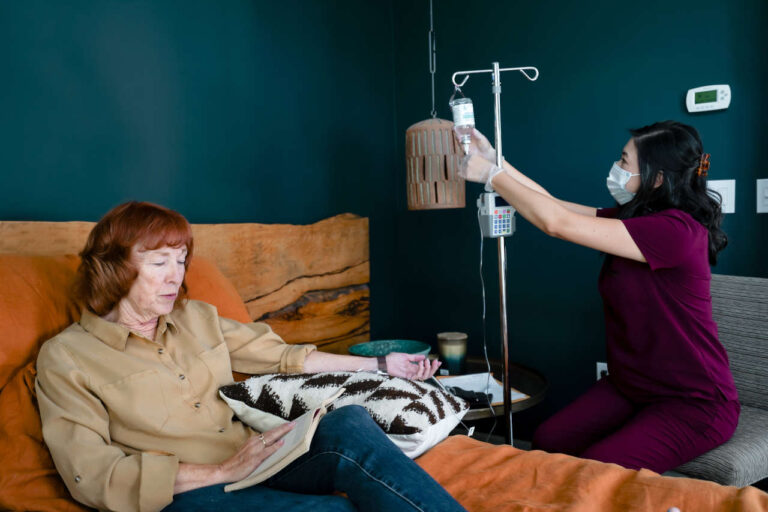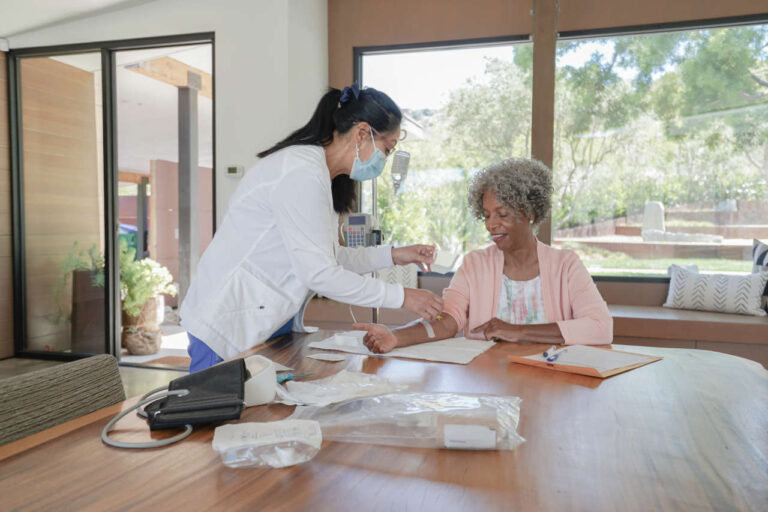
Globulin miễn dịch tiêm tĩnh mạch (IVIG) thường được khuyến cáo như một phương pháp điều trị thay thế cho bệnh giảm bạch cầu tự miễn khi các phương pháp điều trị đầu tay như các yếu tố tăng trưởng (chẳng hạn như yếu tố kích thích khuẩn lạc bạch cầu hạt [G-CSF]) và thuốc kháng sinh không cải thiện được tình trạng của bệnh nhân.
Nhận hỗ trợ tài chính
Giảm bạch cầu trung tính tự miễn (AIN) là một tình trạng bệnh lý hiếm gặp có thể ảnh hưởng đến cả trẻ em và người lớn. Tình trạng tự miễn này khiến cơ thể khó chống lại các bệnh nhiễm trùng có khả năng gây tử vong do số lượng bạch cầu trung tính trong máu giảm (dưới 1.500/microlit).
Nếu bác sĩ đã đề nghị liệu pháp IVIG cho bạn hoặc con bạn, điều quan trọng là phải hiểu rõ cơ chế hoạt động của liệu pháp này. Bài viết này giải thích mọi thông tin bạn cần biết về IVIG và cách nó hỗ trợ bệnh nhân bị giảm bạch cầu trung tính tự miễn.
Bệnh giảm bạch cầu tự miễn (AIN): Tổng quan
Giảm bạch cầu trung tính tự miễn là một tình trạng tự miễn hiếm gặp, trong đó bệnh nhân có số lượng bạch cầu trung tính thấp. Điều này chủ yếu xảy ra do các tự kháng thể do hệ thống miễn dịch sản xuất ra. nhắm mục tiêu và tiêu diệt các bạch cầu trung tính khỏe mạnh.
Bạch cầu trung tính là một loại tế bào bạch cầu giúp cơ thể chống lại nhiễm trùng bằng cách tiêu diệt các tác nhân gây bệnh như vi khuẩn và nấm. Tuy nhiên, việc loại bỏ bạch cầu trung tính bởi các tế bào miễn dịch làm giảm tổng số lượng loại tế bào này trong máu. Khi số lượng bạch cầu trung tính thấp, những người bị giảm bạch cầu trung tính có nguy cơ nhiễm trùng cao hơn người khỏe mạnh.
Giảm bạch cầu trung tính tự miễn được phân loại là nguyên phát hoặc thứ phát tùy thuộc vào nguyên nhân chính xác gây ra tình trạng giảm bạch cầu trung tính. Ví dụ:
Bệnh giảm bạch cầu trung tính tự miễn nguyên phát
Tình trạng này xảy ra như một rối loạn độc lập, nghĩa là do phản ứng miễn dịch bất thường gây ra và chủ yếu phổ biến ở trẻ em và trẻ mới biết đi. Giảm bạch cầu trung tính tự miễn nguyên phát ảnh hưởng đến khoảng 1/100.000 trẻ em dưới 10 tuổi.
Giảm bạch cầu trung tính tự miễn thứ phát
Loại này thường gặp ở người lớn tuổi và xảy ra như một tác dụng phụ của các nguyên nhân tiềm ẩn khác, như rối loạn tự miễn dịch (như lupus hoặc viêm khớp dạng thấp), hoặc thậm chí là ung thư máu (trong một số trường hợp hiếm gặp) khiến hệ thống miễn dịch của bạn tiêu diệt bạch cầu trung tính.
IVIG giúp ích gì cho bệnh nhân bị bệnh giảm bạch cầu tự miễn?
IVIG là một phương pháp điều trị được tạo ra từ huyết tương của hàng ngàn người hiến tặng khỏe mạnh. Huyết tương này chứa globulin miễn dịch (kháng thể) được thu thập, tinh chế và truyền cho bệnh nhân qua tĩnh mạch (tiêm tĩnh mạch).
Các kháng thể giúp làm dịu hệ thống miễn dịch hoạt động quá mức ở những bệnh nhân bị giảm bạch cầu trung tính tự miễn. IVIG giúp nhiều cách:
1. Nó ngăn chặn sản xuất kháng thể tự động
Vì hệ thống miễn dịch tấn công nhầm vào các tế bào khỏe mạnh, như bạch cầu trung tính, bằng cách sản xuất ra các kháng thể tự miễn, IVIG sẽ ngăn chặn việc sản xuất các kháng thể bất thường này để ngăn ngừa tổn thương thêm.
2. Nó ngăn chặn sự liên kết của các kháng thể tự miễn với các tế bào đích
Các globulin miễn dịch được cung cấp thông qua liệu pháp IVIG sẽ liên kết với các kháng thể tự miễn và ngăn chúng liên kết với các thụ thể bề mặt của tế bào bạch cầu trung tính, giúp bảo vệ các tế bào thiết yếu này.
3. Nó làm giảm viêm
IVIG cũng có tác dụng chống viêm. Nó giúp giảm sưng và tổn thương mô có thể xảy ra khi hệ miễn dịch hoạt động quá mức.
4. Nó hỗ trợ hệ thống miễn dịch
Vì tình trạng giảm bạch cầu trung tính khiến mọi người có nguy cơ nhiễm trùng cao hơn nên IVIG có thể cung cấp thêm kháng thể để giúp cơ thể chống lại vi trùng.
5. Nó tạm thời tăng số lượng bạch cầu trung tính
Trong nhiều trường hợp, IVIG làm tăng tạm thời số lượng bạch cầu trung tính, có thể làm giảm nguy cơ nhiễm trùng và các biến chứng liên quan.
Nói chuyện với một chuyên gia
Về Trợ cấp đồng thanh toánIVIG có hiệu quả như thế nào đối với bệnh nhân giảm bạch cầu tự miễn: Bằng chứng lâm sàng
Các nghiên cứu về việc sử dụng IVIG để điều trị giảm bạch cầu trung tính tự miễn còn hạn chế. Tuy nhiên, một số nghiên cứu lâm sàng và báo cáo ca bệnh quy mô nhỏ cho thấy IVIG có thể là một lựa chọn điều trị an toàn và hiệu quả cho các bệnh lý máu tự miễn ở trẻ em, bao gồm cả giảm bạch cầu trung tính.
Ví dụ, một nghiên cứu được công bố trên tạp chí “Tạp chí Y khoa Hoa Kỳ” báo cáo rằng sáu trẻ sơ sinh dưới hai tuổi bị nhiễm trùng nặng và giảm bạch cầu trung tính dai dẳng (ANC 300/mm³) đã được điều trị bằng IVIG (1 g/kg) cho đến khi số lượng bạch cầu trung tính vượt quá 1.000/mm³. Sự gia tăng bạch cầu trung tính kéo dài khoảng 14 ngày, cho thấy IVIG có thể giúp phục hồi bạch cầu trung tính nhanh chóng và tạm thời ở trẻ sơ sinh bị giảm bạch cầu trung tính nặng.
Tương tự, một nghiên cứu khác cho thấy 16 trẻ em mắc các bệnh lý máu tự miễn - bao gồm hai trẻ bị giảm bạch cầu trung tính tự miễn - đáp ứng tốt với điều trị IVIG. Những bệnh nhân này được truyền IVIG từ 1 đến 50 lần trong khoảng thời gian từ 1 đến 30 tháng. Tương tự như vậy, báo cáo trường hợp của một bệnh nhân mắc bệnh Hodgkin bị giảm bạch cầu tự miễn cho thấy mức bạch cầu trung tính tăng tạm thời sau khi dùng IVIG liều cao (thay vì steroid).
Mặc dù phản ứng chung của IVIG thường ngắn hạn, nhưng nó mang lại cơ hội điều trị các bệnh nhiễm trùng tiềm ẩn nghiêm trọng.
Ai cần IVIG để điều trị bệnh giảm bạch cầu tự miễn?
IVIG không phải lúc nào cũng là lựa chọn điều trị đầu tiên. Nhiều người bị giảm bạch cầu trung tính nhẹ có thể hồi phục tốt nếu được theo dõi chặt chẽ và thực hiện vệ sinh tốt. Tuy nhiên, IVIG có thể được khuyến nghị nếu:
- Người đó bị nhiễm trùng thường xuyên hoặc nghiêm trọng
- Số lượng bạch cầu trung tính cực kỳ thấp
- Các phương pháp điều trị khác, như G-CSF, thuốc kháng sinh hoặc steroid không có tác dụng hoặc không phù hợp
- Bệnh giảm bạch cầu trung tính có liên quan đến các bệnh tự miễn dịch khác hoặc rối loạn hệ thống miễn dịch
Bác sĩ thường sẽ tiến hành xét nghiệm máu, theo dõi tiền sử nhiễm trùng và xem xét tình trạng sức khỏe tổng thể trước khi quyết định liệu IVIG có phải là lựa chọn phù hợp hay không.
Bạn có thể mong đợi điều gì trong quá trình điều trị IVIG?
Trước khi điều trị bằng IVIG, bác sĩ sẽ đánh giá sức khỏe của bạn và kiểm tra xem bạn có bị dị ứng hoặc vấn đề về thận không. Xét nghiệm máu có thể được thực hiện để đo mức độ miễn dịch và số lượng bạch cầu trung tính.

Trong quá trình điều trị
IVIG được truyền qua đường tĩnh mạch (IV) trong vài giờ. Hầu hết mọi người đều dung nạp tốt, nhưng cần truyền chậm để tránh các tác dụng phụ liên quan đến truyền dịch. Tùy thuộc vào phản ứng của cơ thể, bạn có thể được truyền IVIG vài tuần hoặc vài tháng một lần.
Sau khi điều trị
Bạn có thể cảm thấy mệt mỏi hoặc gặp các tác dụng phụ nhẹ như đau đầu, ớn lạnh, sốt hoặc buồn nôn sau khi tiêm IVIG. Tuy nhiên, những tác dụng phụ này tác dụng phụ thường kéo dài trong thời gian ngắn. Bạn có thể tham khảo ý kiến bác sĩ nếu bất kỳ triệu chứng nào được đề cập ở trên vẫn tiếp diễn hoặc nếu bạn gặp các triệu chứng mới khác.
Hỏi về dịch truyền IVIG tại nhà
Liều lượng IVIG khuyến cáo cho bệnh giảm bạch cầu tự miễn nặng là bao nhiêu?
Đối với những bệnh nhân bị giảm bạch cầu trung tính tự miễn dịch nghiêm trọng, IVIG có thể được dùng với liều lên đến 2 g/kg mỗi tuần (liều đơn hoặc chia liều) trong 4 tuần. Người đáp ứng có thể nhận được liều tương tự khi tái phát.
Mua mang về
Mặc dù IVIG thường không phải là phương pháp điều trị đầu tay cho bệnh giảm bạch cầu trung tính tự miễn, nhưng nó có thể làm giảm đáng kể nguy cơ nhiễm trùng nghiêm trọng bằng cách cải thiện phản ứng miễn dịch của cơ thể và hỗ trợ tạm thời để tăng mức bạch cầu trung tính. Vì tác dụng của nó thường ngắn hạn, việc sử dụng lâu dài cần được đánh giá và theo dõi cẩn thận. Nếu bạn đang cân nhắc sử dụng IVIG như một phần của kế hoạch điều trị, điều quan trọng là phải thảo luận kỹ lưỡng với bác sĩ chăm sóc sức khỏe để cân nhắc các lợi ích, rủi ro tiềm ẩn và các phương án thay thế dựa trên tình trạng của bạn.
TÀI LIỆU THAM KHẢO:
- Hilgartner, MW, & Bussel, J. (1987). Sử dụng gamma globulin tiêm tĩnh mạch để điều trị bệnh giảm bạch cầu trung tính tự miễn ở trẻ em và thiếu máu tan máu tự miễn. Tạp chí Y khoa Hoa Kỳ, 83(4), 25-29. https://doi.org/10.1016/0002-9343(87)90547-X
- Jinca, C., Serban, M., Ursu, E., Munteanu, A., & Arghirescu, S. (2021). Giảm bạch cầu trung tính tự miễn dịch nguyên phát ở trẻ sơ sinh và trẻ nhỏ ở một nhóm bệnh nhân đến từ miền Tây Romania. Y học Thực nghiệm và Trị liệu, 21(3). https://doi.org/10.3892/etm.2021.9711
- Độ đặc hiệu của kháng thể bạch cầu trung tính trong các loại giảm bạch cầu trung tính tự miễn khác nhau ở trẻ em. (1999). PubMed. https://pubmed.ncbi.nlm.nih.gov/10477706/
- Quản trị Ig – Tiêu chí sử dụng immunoglobulin trong lâm sàng tại Úc. (nd). https://www.criteria.blood.gov.au/MedicalCondition/View/2509
- Kurtzberg, J., Friedman, HS, Chaffee, S., Falletta, JM, Kinney, TR, Kurlander, R., Matthews, TJ, & Schwartz, RS (1987). Hiệu quả của gamma globulin tiêm tĩnh mạch trong điều trị rối loạn tạo máu do tự miễn ở trẻ em. Tạp chí Y khoa Hoa Kỳ, 83(4), 4–9. https://doi.org/10.1016/0002-9343(87)90544-4
- Chaudhari, Thủ tướng, & Mukkamalla, SKR (2023, ngày 15 tháng 1). Bệnh tự miễn và giảm bạch cầu trung tính mãn tính. StatPearls – NCBI Bookshelf. https://www.ncbi.nlm.nih.gov/books/NBK560901/#:~:text=Autoimmune%20neutropenia%20(AIN)%20is%20a,present%20on%20IgG%20Fc%20receptors.













